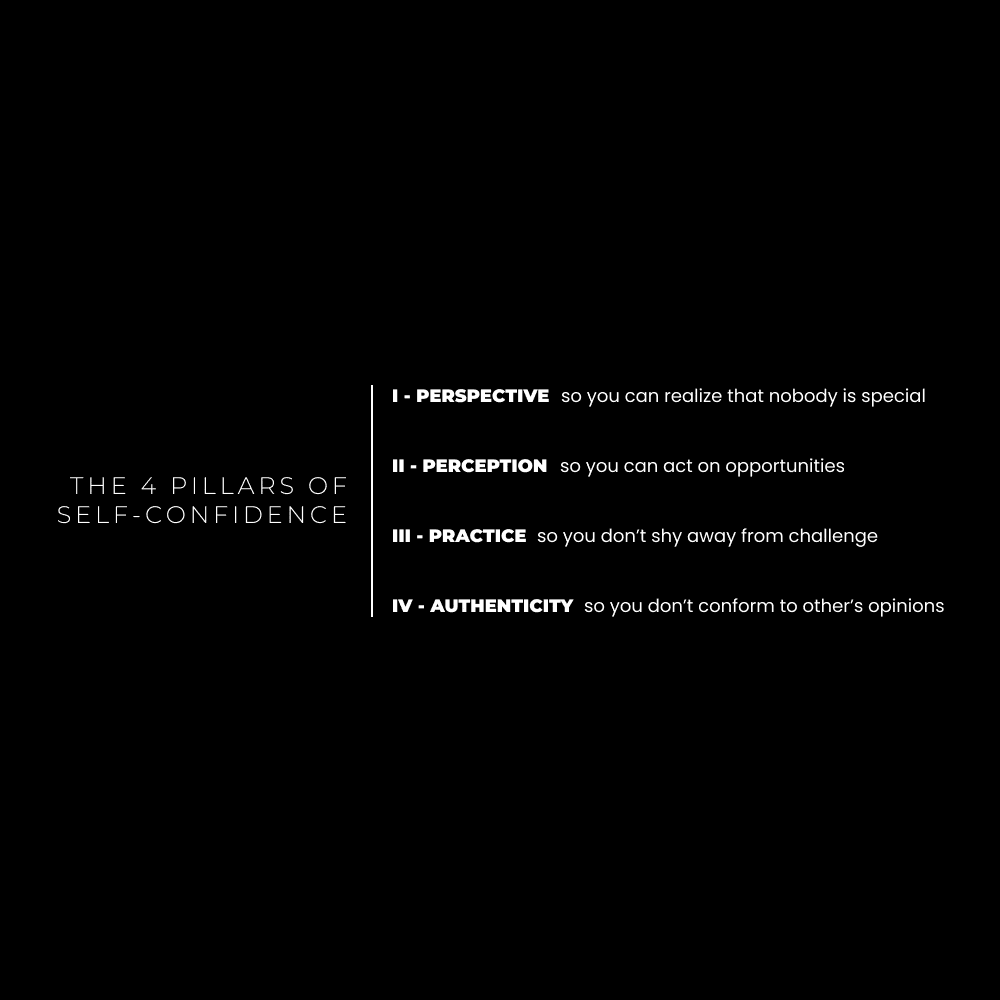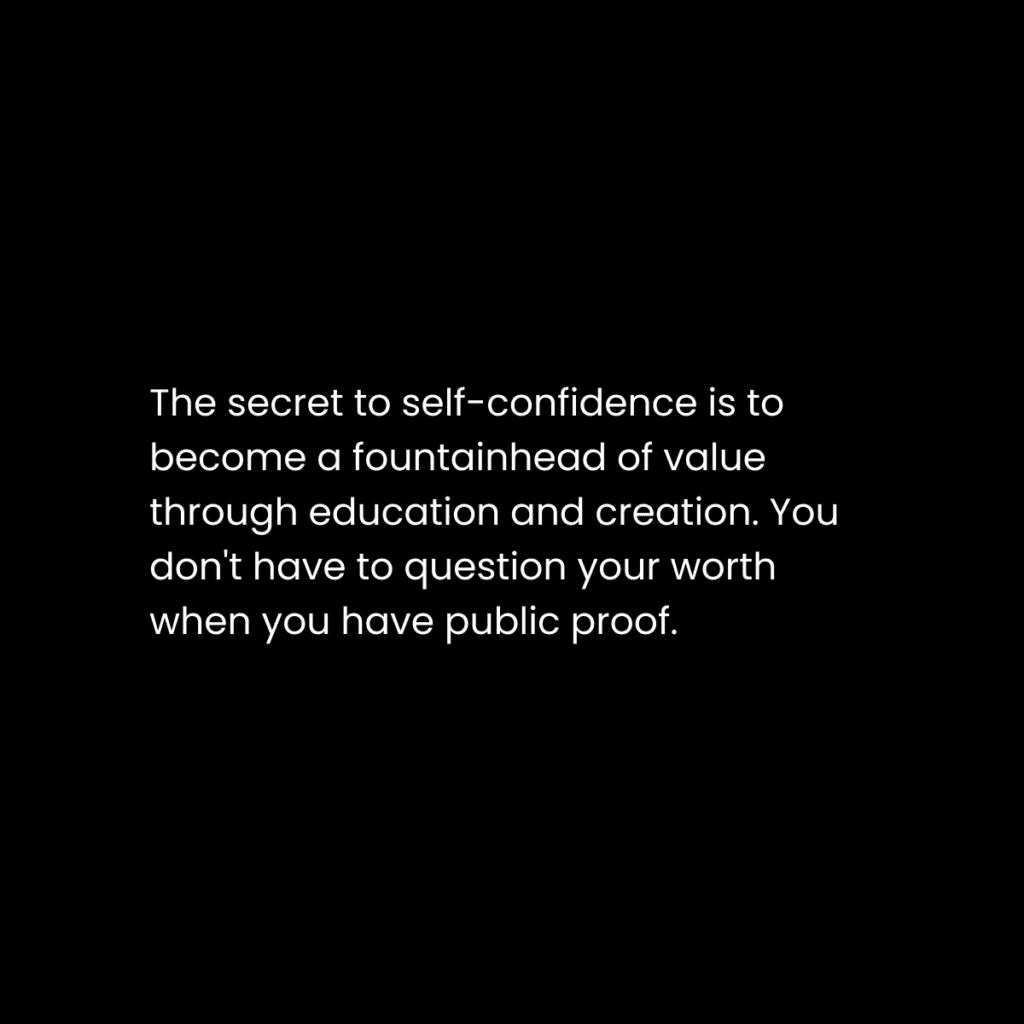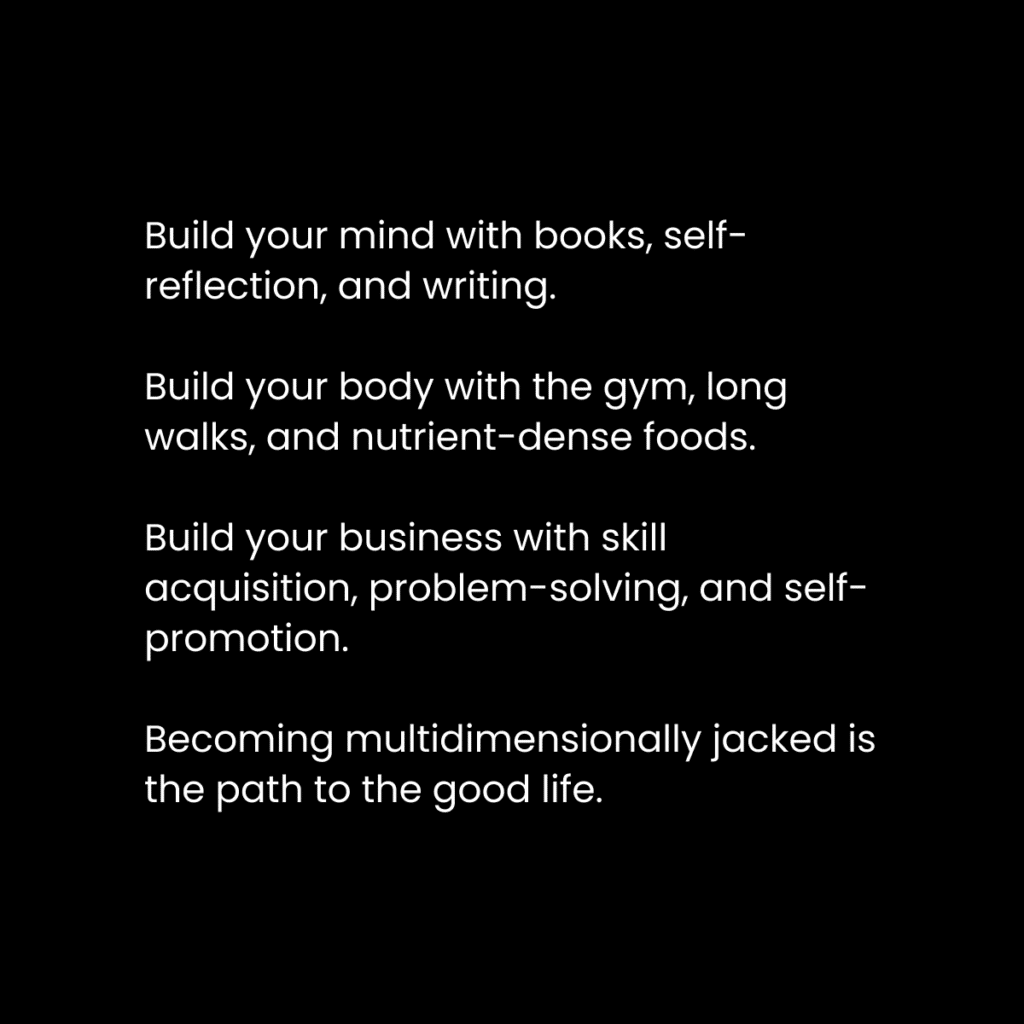You stop caring about others’ opinions when you trust yourself with your future.
That… is a lot to unpack.
Lack of confidence is the one thing that plagues the potential of the majority of the population. They care too much about what others think.
Let’s say you want to start a business and the thoughts start to flood in:
What will my parents think?
What will my friends think?
What will my spouse think?
Will it be enough to replace my income?
How long will it take?
Don’t even get me started on the thoughts that come when you actually start building the business.
The reason people fail is they can’t lift the emotional weights required to achieve the goals they set.
For every thought of a better life, there are 100 thoughts beating you back down.
And that’s just thoughts about business.
What about the other 60-80,000 thoughts we have in a day?
We have a lot on our plate.
Will I come off as weird when I try to make new friends?
Where will I end up in life if I don’t get my debt under control?
Did I feed the dog this morning? Imagine how terrible of a pet owner people would think I am if they found out.
Developing self-confidence is no easy task.
More information, more responsibilities, and more options for our future turns confidence into success and anxiety into failure.
This is the modern environment we live in.
How do we begin to cultivate the trust in ourselves that leads to self-confidence?
The 4 Pillars Of Self-Confidence

When most people wonder how they can become more confident, they are reminded of the simplistic advice:
“Confidence = competence.”
This is true, but most people will see competence as getting better at a specific skill.
So they’ll learn and learn and learn, never act, never self-reflect, and never actually develop confidence as a skill in any situation. This is the most common outcome.
There is depth behind that simple statement that few can see.
We must seek to understand that statement, because clearly “confidence = competence” as general advice has not fixed one of the biggest problems in the world, but has made it worse.
Pillar 1) Perspective
When you enter a situation where you don’t feel confident, anxiety shoots through the roof.
This closes your mind to everything but your thoughts.
They multiply.
You completely retract from the situation and become a slave to your past. The experiences you’ve had before. You remain the same person.
You must snap out of this and make a conscious effort to reprogram your habitual way of reacting to situations.
To do this:
- When you enter a situation and anxiety sparks, pause
- Zoom out to see the situation for what it is, just a normal situation
- Transfer consciousness to those in the situation with you
“Transferring consciousness” is adopting another person’s perspective.
Most people are just people living the same experience as us.
Billionaires are people with the same problems.
Fitness models are people with the same problems.
Any person you mentally place above you has the same problems.
The ONE thing that will make them react in a negative way to you is treating them like they aren’t human.
Don’t put them above you.
Remember, this is a habit you are forming.
It will take repetition and practice.
You cannot advance to the other pillars if you do not gain perspective on a situation.
Pillar 2) Perception
How you perceive situations determines how you act.
This requires you to shift into an open-minded state before and maintain it during, the situation.
If you are scrolling social media and don’t perceive a business owner’s tweet as an opportunity to reach out, you won’t reach out.
If you do see it as an opportunity, you still may botch the message or not send one at all because you misperceive that individual.
The same goes for making new friends or engaging in difficult discussions.
Perception goes two ways.
You perceive others in a certain way based on how they present themselves.
They perceive you based on how you present yourself.
If you don’t “look the part” or hold yourself in a way that would lead to a positive interpretation by the other party, it won’t go well. And you will know this subconsciously. You won’t engage in situations because you set yourself up for failure in the way you look and act.
I’m as introverted as they come, but people often tell me I look confident in the way I dress, walk, and talk.
Practice.
Pillar 3) Practice
How good you are at something allows you to perceive situations better.
Think of skill acquisition as a way to increase your level in the game of life.
In a video game there are “skill trees.”
As you play the game, you choose skills to help you play how you want.
As you practice those skills, you increase your experience, and new skills become available to you.
The key point here:
You are not able to access other skills until you practice the ones available to you.
You don’t have the awareness of profitable opportunities because you don’t have the skill to recognize, choose, and act on them.
As you move toward your goals, it will require that you educate and practice skills to reach those goals.
If you aim too high, you get overwhelmed and don’t know what to learn.
You must play at your level and acquire the skills necessary to reach the next level.
As your level increases, you fill your toolbelt with skills that allow you to view the plane you are on, which is more vast than the lower level you were at.
My first successful endeavor was freelance web design.
A single skill that is available for anyone to learn. Lots of competition and battling for higher prices.
I knew that if I wanted to do something more profitable, like funnels for service businesses, I would have to learn skills like marketing, copywriting, and buyer’s journey to do that well.
Then, when I pursued the level of a creator, I needed to combine what I knew and add new skills like content writing (I teach all skills you need in 2 Hour Writer).
The higher my level grew, the more people I met, and the more my confidence throughout multiple domains increased.
The worst thing you can do is stop learning new skills and settle for the level you are at.
Pillar 4) Authenticity
Authenticity is doing what you want without interference from external thoughts, opinions, and beliefs that you feel the need to conform to.
When I curse, and people in the comments tell me that’s unprofessional, do I conform to their relative beliefs (that aren’t absolute truth) or do I think for myself?
I don’t care to be professional. I don’t care to be offended by words that every single person interprets in a different way.
Confidence through authenticity is a mental game.
You must play it daily.
You must pause, gain perspective, perceive the situation, and practice the skill that the situation requires.
Authenticity is how you implement the 4 Pillars of Self-Confidence.
The Unconventional Path To Self-Confidence

Entrepreneurship is in your nature.
To pursue new challenges, never settle, expand your perspective through skill acquisition, and get feedback on if you are actually contributing to society in the form of money.
Entrepreneurship is creation.
And being a creator is the act of channeling the divine through your human edge.
You don’t want to get stuck in a situation where challenge ceases to exist.
Like a monkey in a cubicle, your psyche will suffer, and you will wonder why your life isn’t fulfilling even if you are a top 1% earner.
Personal growth is a gateway drug into business growth.
And business growth is the unconventional path to self-confidence.
I combine the two in Digital Economics so you can improve yourself, productize yourself, and earn from being yourself. A natural progression.
1) It demands that you evolve, or die.
Most people die at 25.
They get their job.
They get their spouse.
They get their house.
They get their car.
They get exactly what society wants for them. Someone who is comfortable, docile, and of little threat to their system they are trying to survive.
Life is ever-flowing, ever-evolving, and if you choose to obstruct that flow by settling for a sub-par life, you’re dead.
Death is symbolic. And all understanding is metaphorical.
If life is growth, and growth requires new, death is the death of new ideas, potentials, projects, and practices.
If you want to survive in a world that never stops changing, entrepreneurship ensures that you don’t. If you persist until success, that is.
2) It demands you to become an expert in your industry.
If you have subpar understanding you will get subpar results.
Understanding is different from knowledge.
Understanding is the upward motion of expanding consciousness.
Meditation is the downward motion of expanding consciousness.
Most mystics and spiritual teachers forget this balance.
It’s not creativity or productivity.
It’s not monk or warrior.
It’s not peace or progress.
It’s not being or doing.
It’s both.
It’s life.
The duality collapses into one.
If you stack theory without practice, you will fail in this business.
You need both daily education and execution. Not one or the other.
3) It demands you get results for yourself and your customers.
If you don’t get results, you aren’t valuable.
Simple as that.
If you aren’t getting results, that isn’t a sign to quit. It’s a sign to improve. True value requires development over time.
Entrepreneurship is how you ensure that you develop yourself into a valuable asset in reality.
4) It demands that you suck at what you’re doing so you can improve.
It is foolish to think that you will not suck at almost everything at the start.
This is what keeps most people from acting on their dreams.
Once you overcome the first hump, you snowball into a season of pure progress.
5) It demands that you change your work, rest, and play habits.
You cannot reach level 3 with the character that got you to level 2.
Growth requires change and that’s why most people settle early.
6) It demands a skill set in psychology so you understand your mind.
Marketing, sales, writing, and speaking are the backbone of business success.
In today’s world, wealth is generated through code and content.
Code is the back end of the internet.
Content is the front end.
Combine both and you have people and product.
Send people to product and you have profit.
You can learn to code, which is incredibly valuable, but unless that is a passion of yours you are better off learning content.
You can build using what the coders build (like website builders, social media platforms, and everything else on the internet) to distribute your content.
Content requires self-understanding.
You must capture attention, hold attention, and deliver value to that attention.
I discuss this in The $1 Million Dollar Skill Stack.
A Potential Progression For Self-Improvers

The anxiety trap is dangerous when you attempt to become more confident.
You get anxious approaching new people.
You get anxious about the change required to build a business.
When you feel it, pause.
(No, seriously, this is going to take a conscious effort… pause.)
Zoom out.
Reframe your mind.
The cure to anxiety is curiosity.
That’s it. That’s the reframe.
When you’re anxious about starting a business, you are projecting so far into the future that clarity is impossible. Your mind cannot bring order to the chaotic situation you mentally reside in.
Bring your attention back to what you can do right now.
Get curious about what you can start learning, then learn it.
When you are in a social situation, stop imagining every little detail about the future with that person.
Focus your attention on them, right in front of you.
What is something that catches your eye?
Ask them about it.
Here’s how you can leverage curiosity to build momentum into a profitable business (with self-confidence as a byproduct).
1) Start With Writing
When you aren’t confident, writing is your best bet.
And, it’s the foundation of any and all content.
Tweets, ads, videos, reels, etc all start with writing the actual post or a script.
Writing allows you to flex your intelligence while everyone else competes for looks.
You don’t have to show your body, or even your face for that matter. (Orange Book is one of my favorite anonymous writers.)
To become a good writer, you will need to understand psychology to structure a message that captures, holds, and spreads attention.
To understand psychology, study marketing and sales. That’s how you learn to apply your psychological understanding in the real world.
If I were to give you a path, here’s how to start writing:
- Choose a topic you are interested in making your full-time gig
- Block out 30 minutes to learn about marketing, sales, or your interest
- Do not skip a day of learning. Watch videos, podcasts, read books and internet content.
- Take notes on the ideas that stick out to you.
- Start on Twitter (X) or Threads and start posting your ideas.
- Study social media as a skill so you can grow (I teach all of this in 2 Hour Writer).
In the course of 3-6 months, you should gain a decent amount of followers.
Enough to give you confidence that you can make this your full-time business.
Once you have enough readers, you can create a product or service to monetize your writing.
The marketing and sales knowledge will compound at this moment.
2) Branch Into Speaking
Most people don’t know this, but the first platform I branched out to was not Instagram. It was a podcast.
Why?
- It helped me meet high-level people and get offered more opportunities.
- You don’t need video editing skills. It is an easy progression from writing.
- It forces you to identify your blind spots in communicating with other people.
I didn’t use a podcast to monetize or become famous.
That is incredibly rare with podcasting.
I used it to get people I wanted to talk to on a call.
People LOVE getting on podcasts.
I wanted to talk with Justin Welsh, so I asked him to do a podcast, and that gave new vision for my brand.
Our chat on one-person businesses was the catalyst for me gaining 150k subscribers in less than 6 weeks on YouTube.
That’s another next step.
You can go straight to YouTube with your previous writing.
You can literally see the increase in confidence you get after creating 6 months of videos.
You become less awkward, more concise, and more impactful.
Your business compounds as your confidence does.
3) Create A Product Or Service
By now you are growing an audience.
You have people.
Well, hopefully. If you don’t, you need to zoom out and realize it’s a skill issue. You need a big picture understanding of social media to get eyes on good content however you can.
Money requires people and a product.
“Product” can also include services here. It is what you sell to the people you’ve attracted.
This is the only way to make money.
You can aim to be one of the select few that lives off of ad revenue (generated from the social media platform) alone, but you will be a slave to the algorithm.
Creating your own product or service is how you take control of your income.
Social media as a skill becomes a faucet that you can turn on whenever you want to make more money.
You know how to attract people and you have a product that sells.
(There’s a lot that goes into both, you will need to improve at both.)
I’ve written about this extensively, so here are some letters to learn how to create a product:
– An overview of the one person business model
– The best way to create an offer even as a beginner
– How to productize the $100,000 worth of knowledge in your head
The reason building a product or service helps with confidence is this:
- You will suck at first. This is the case for literally anything else you do. Don’t see it as scary just because business seems foreign to you.
- You get direct feedback on what can be improved. People can be brutal, but most are nice.
- If you want to actually make money, you need to actually provide value. If you aren’t continuing to grow your audience or money – maybe start thinking about how valuable you really are.
That’s it for this one my friends.
Go practice confidence as a skill, for life.
– Dan Koe



